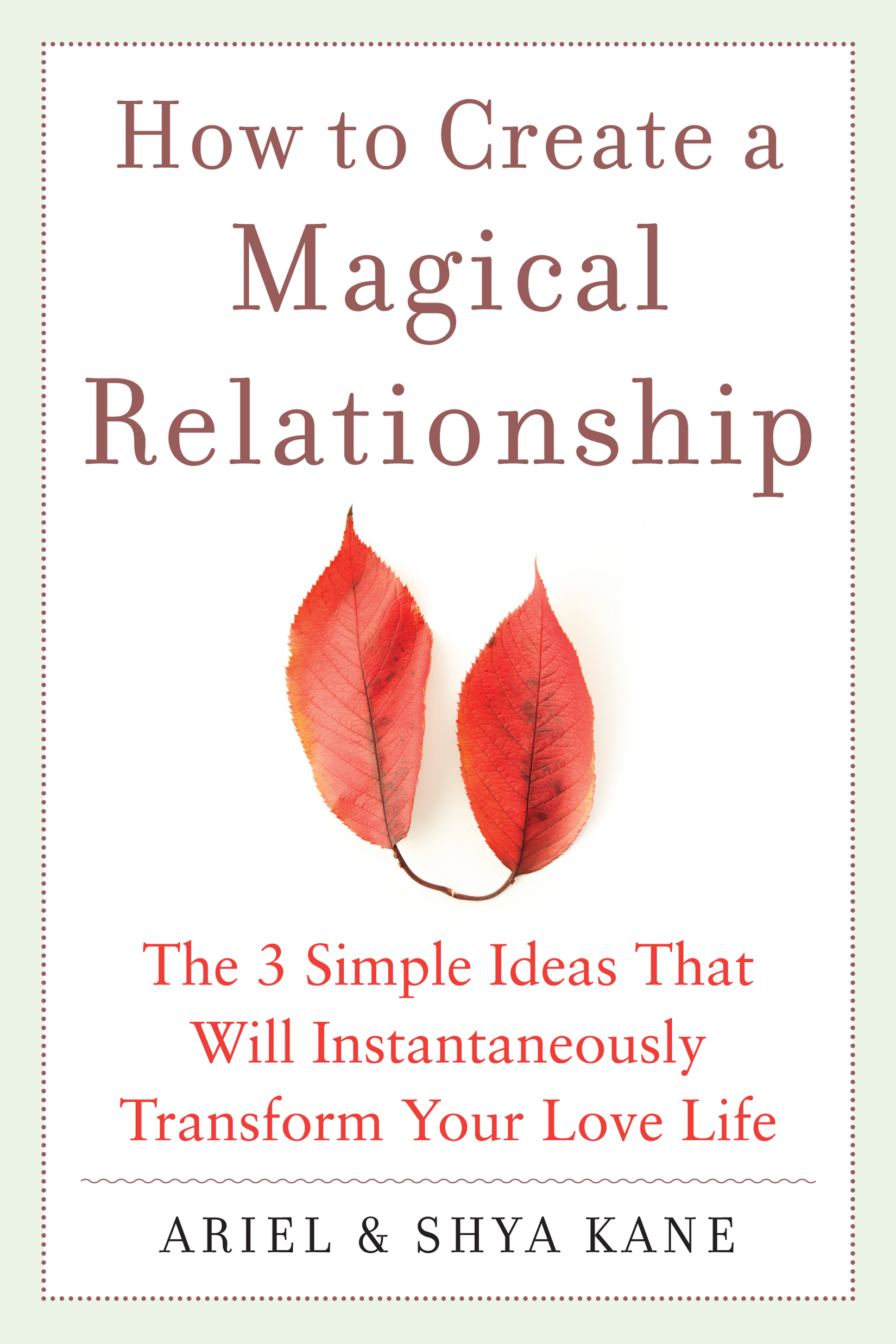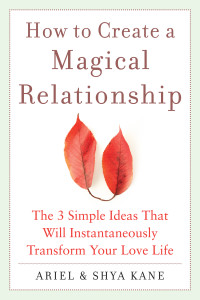An excerpt from How to Create a Magical Relationship, The Three Simple Ideas That Will Instantaneously Transform Your Love Life by Ariel & Shya Kane
We teach courses all over the world and have discovered that whatever the culture, whatever the language, people often don’t really, truly listen. Listening is often perceived as a passive act. The two of us have discovered that when ‘true listening’ is present, satisfying communication is sure to follow. This chapter is devoted to the art of listening. If you discover those things that keep you from listening, you will simultaneously discover many of the things that get in your way in relationships and in dayâtoâday interactions. If you learn the art of listening, you will become more effective, productive and satisfied in all aspects of your life.
True listening is not something that we have been taught growing up in our families, amongst our friends or in school. True listening requires being in the moment. It also requires letting go of your point of view, your thoughts and your agendas. True listening is an art.
Have you ever examined whether or not you are truly listening? Have you identified what inhibits your ability to actually hear what another is saying with the intention of seeing what he or she means from his or her point of view? What we are talking about here is a selfâeducation program.
First you must have the desire to discover how you listen and how you interact with your life from a nonâjudgmental point of view. It is not about trying to change or fix what you notice in the self examination of your own behavioral patterns. If you just notice how you are relating to your life, that in itself is enough to complete previously disturbing patterns of behavior. Frequently, there are no other actions needed. This also applies to the way in which you listen, don’t listen or distract yourself from listening.
TRUE LISTENING
If a person doesn’t feel heard, then frustration builds and misunderstandings are sure to happen. It requires a degree of openness, however, to actually hear what is being said. There are impediments to truly listening to your partner. People frequently are not open to hear simply because they are already involved in a thought or action. We as human beings can only do one thing at a time, if we expect to do it well. Making sure you have your partner’s attention is the best way to start when you are saying something of importance.
TRUE COMMUNICATION REQUIRES LISTENING TO HEAR WHAT IS BEING SAID FROM THE POINT OF VIEW OF THE SPEAKER. THIS IS AN INTENTIONAL UNDERSTANDING OF THE OTHER’S POINT OF VIEW.
PREâOCCUPATION WITH A PROBLEM
If you are preâoccupied with a thought or something you consider problematic, then you can’t listen because your mind can only hold one thing at a time. If you are worrying about something, then you won’t hear what is being said to you.
Most of us are unaware when we are actually doing something other than listening. We haven’t realized that we are preâengaged or preâoccupied so that we only partially hear what is being said and that partial hearing is almost always inaccurate.
Have you ever noticed how some people say the same things to you over and over? That is generally because you didn’t really hear them the first time. Since true listening is an active rather than a passive act, it requires your full attention. If you are at all preoccupied while listening to another, they are left with the feeling that they have not been heard. Which is, in fact, true. How could a baseball player catch a ball if they already have a baseball in their mitt? This is essentially what you are trying to do if you are preâoccupied while listening to another. It is as if you are trying to catch a communication while your ‘mitt’ is already full.
FILLING IN WITH WHAT YOU EXPECT
When you are in a relationship with someone, after a period of time, you believe that you know this person and that you already know what he or she is going to say. When the first few words come out, you assume you know where it is going. So, in your mind, you fill in the blanks with what you expect to hear and stop listening to what your partner is actually saying. You may be right, most of the time. But there are times when your partner is about to say something else and you are not receptive because you already have the ball in your mitt. Or you may not even hear what is being said because you think you know it already and have already moved on in your thoughts. If so, chances are your partner will feel disregarded.
PROVING YOURSELF RIGHT
At this point, we must talk again about the principles of physics, also the second principle of transformation that says: No two things can occupy the same space at the same time. If your mind is already preâoccupied with what you are intending to say when you get your chance, then there is no possibility that you can actually hear what is being said to you. And that is on the most basic level. If you are defending your point of view, then you won’t want to hear what is being said. When you are defending yourself, your mind will manipulate what is being said so that you can disagree, prove it wrong and prove yourself, or your point of view, right.
Have you ever found yourself finding fault with your partner’s use of words or a particular word, rather than allowing yourself to hear the essence of what he or she is saying? Frequently, when people engage in conversation, they are trying to prove that what they believe to be true is true. And so, when we listen to another, we are still holding onto our point of view.
IF YOU DROP WHAT YOU WANT TO SAY AND LISTEN, WHEN YOU DO RESPOND, YOU MIGHT DISCOVER SOMETHING WHOLLY NEW AND MORE APPROPRIATE TO SAY THAN WHAT YOU HAD PLANNED. IF WHAT YOU INITIALLY HAD TO SAY IS STILL RELEVANT, IT WILL COME BACK ON ITS OWN.
LISTENING WITH AN AGENDA
A major inhibitor to listening is one’s agenda. Wanting something when you talk with another person is not a problem, if you are aware of it. For instance, as a sales person, if you get paid a commission for what you sell, obviously you have a preference that potential customers will purchase something. However, if you push to meet your agenda rather than paying attention to your customers’ needs, you are sure to turn people off and lose sales. In effect, going for your agenda often produces the opposite of the desired result.
Please don’t misunderstand. There is nothing wrong with having an agenda. If you want a better relationship or more intimacy, for example, that is not a problem. The problem arises when you are unaware of your agendas and you are mechanically driven to fulfill them. If you are aware of the things you want (or don’t want) then you can hold these preferences in abeyance and actively listen to what your partner has to say.
COMPASSION â COMPASSION â COMPASSION
If your partner is telling you about something you did or didn’t do that upset him or her, if you realize that you couldn’t have done it any differently than you did, it is possible for you to have compassion for yourself. And when we say compassion for yourself we are talking about a state of grace, of forgiveness. Most of us have the mistaken opinion that we could have lived our lives differently than we did, but if you look back, you will see that everything you did in your life has led you to this point, brought you to where you are now. Though you may think in retrospect that you could have done things another way, when you were actually living through those circumstances, you only did what you could do at the time. You couldn’t have done it any differently in reality. Perhaps, ideally, you would have done things other than the way you did, but again, that is in retrospect.
Everything that has happened in your life could only have happened the way it did and not the way you think it ought to have happened. This opens the door for the possibility for compassion; compassion for yourself and for others. The only thing useful in thinking you could have done things differently is if you want to use the past to torment yourself. We have found that tormenting yourself does not produce great relationships so we suggest that you don’t do this.
REINTERPRETING THE PAST
Even if you accept our premise that ‘what is done is done,’ the past is still open for interpretation. This is where many torment themselves, thereby fettering their abilities to create magical relationships. You can reinterpret any event in your life to fit your current outlook or agenda. The truth is what happened has happened, and if you see it and let it be, then you can get on with your life. What? you might say. Don’t I need to make myself remember and punish myself for wrong doings so that I will never do them again? No, you don’t. If you see something you did or said in error, and actually see it without judging yourself, then you have already learned your lesson. Punishing yourself and feeling badly does not help. If you have truly seen the error of your ways, you never have to repeat them.
THREE GOLDEN WORDS â I AM SORRY
It doesn’t matter how well you communicate, how sensitive you are, how in love and perfectly matched you are with your partner, sooner or later you will do something that blows it. When that happens, there is actually a magic wand that can dissolve the hurt and restore your relationship. Truly apologizing can mend a world of hurts. Saying you are sorry, and meaning it, only hurts your ego, but it can rebuild the bridge between you and another. Then you can experience being in love long after the rose of the first attraction blooms and fades.






